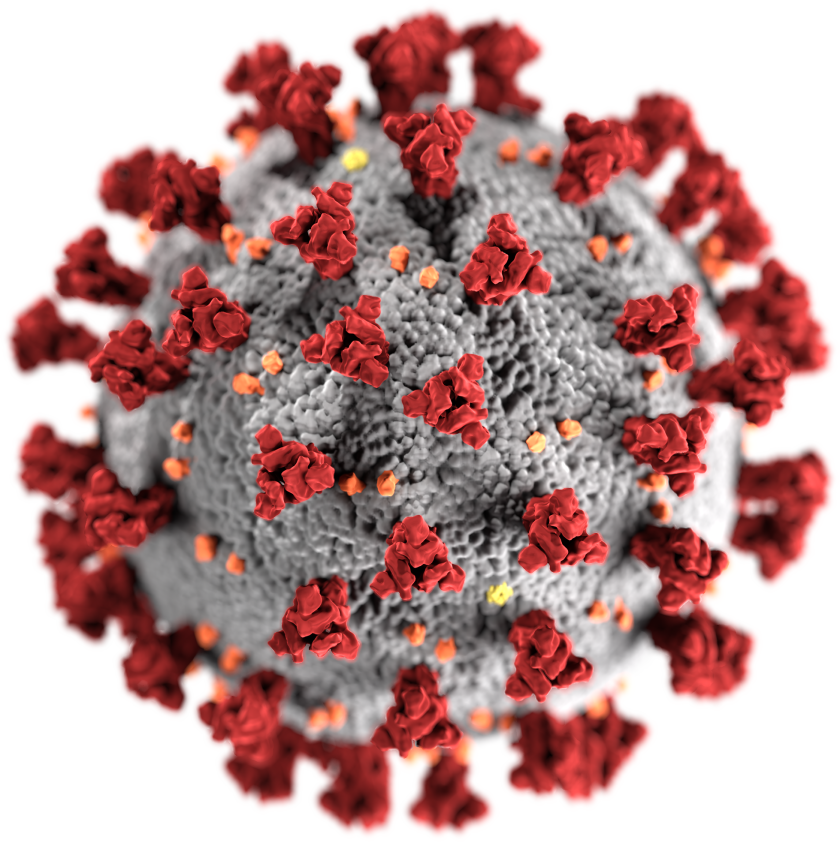04.05.2020 - #Corona: HZB resumes operation step by step

A novel coronavirus (SARS-CoV-2) is spreading worldwide and can cause severe respiratory symptoms (COVID-19). © CDC/Wikimedia commons
After a careful assessment of the situation, the management decided that operations at HZB would be resumed step by step from 4 May onwards. Strict security regulations apply. BESSY II will be available again for in-house research from 11 May. For Sars-CoV-2-relevant measurements a fast access to BESSY II has been established.
We will continuously update the information on this page. We follow the current recommendations of the Robert Koch Institute, the Federal Ministry of Health and the Senate Chancellery and ask all parties involved for their understanding.
Gradual resumption of operations at HZB
The HZB gradually resumes operations - under permanent observation of the situation and strict security regulations.
The BESSY II accelerator will be put back into operation, but will initially only be available to HZB researchers. In the next few weeks, the laboratories will again be able to operate in a restricted manner, in accordance with safety regulations. Please contact the laboratory managers for further details.
User operation at BESSY II will be suspended until 31 May 2020. Exception: Sars-CoV-2 relevant measurements on the MX-Beamlines can be performed. For research groups we have established a fast-track access.
The patient operation in the proton therapy takes place according to plan. Should changes become necessary due to developments, all those affected will be informed.
Furthermore these measures apply:
Immediate cancellation of all events and visitor groups until 20.07.2020 in accordance with the notification of the Senate Chancellery, e.g.:
- The Long Night of Science on 6 June 2020
- Physics for breakfast on 8 July 2020 is cancelled.
- Groups of visitors cannot visit our facilities.
- School lab groups are cancelled.
- Workshops and scientific events are cancelled.
- all trainings offered by HZB company sports are cancelled.
Access for external companies: In order to ensure effective containment of the corona virus, employees of external companies may only enter HZB if they have had no contact with an infected person within the last three weeks (neither privately nor professionally). This must be confirmed in a written form (see download box). Further information can be obtained from your respective contact person at HZB.
HZB staff will get fresh information via the intranet.
red.
https://www.helmholtz-berlin.de/pubbin/news_seite?nid=21180;sprache=en
- Copy link
-
Battery research with the HZB X-ray microscope
New cathode materials are being developed to further increase the capacity of lithium batteries. Multilayer lithium-rich transition metal oxides (LRTMOs) offer particularly high energy density. However, their capacity decreases with each charging cycle due to structural and chemical changes. Using X-ray methods at BESSY II, teams from several Chinese research institutions have now investigated these changes for the first time with highest precision: at the unique X-ray microscope, they were able to observe morphological and structural developments on the nanometre scale and also clarify chemical changes.
-
BESSY II: New procedure for better thermoplastics
Bio-based thermoplastics are produced from renewable organic materials and can be recycled after use. Their resilience can be improved by blending bio-based thermoplastics with other thermoplastics. However, the interface between the materials in these blends sometimes requires enhancement to achieve optimal properties. A team from the Eindhoven University of Technology in the Netherlands has now investigated at BESSY II how a new process enables thermoplastic blends with a high interfacial strength to be made from two base materials: Images taken at the new nano station of the IRIS beamline showed that nanocrystalline layers form during the process, which increase material performance.
-
Hydrogen: Breakthrough in alkaline membrane electrolysers
A team from the Technical University of Berlin, HZB, IMTEK (University of Freiburg) and Siemens Energy has developed a highly efficient alkaline membrane electrolyser that approaches the performance of established PEM electrolysers. What makes this achievement remarkable is the use of inexpensive nickel compounds for the anode catalyst, replacing costly and rare iridium. At BESSY II, the team was able to elucidate the catalytic processes in detail using operando measurements, and a theory team (USA, Singapore) provided a consistent molecular description. In Freiburg, prototype cells were built using a new coating process and tested in operation. The results have been published in the prestigious journal Nature Catalysis.
